
What is a Good Sunscreen?
Find out how to determine a good sunscreen for your own skin needs.
What Is a Good Sunscreen?
Choosing the Right SPF
How to Choose Sunscreen for Your Skin Type
How Do I Choose Sunscreen for My Face?
Choosing a Sunscreen for Your Body
Here is what to consider when selecting a sunscreen for the body:
Hydration:
Consider moisturising ingredients to keep the skin hydrated and prevent dryness caused by sun exposure, such as Hyaluronic Acid, Glycerin, Aloe Vera and Shea butter.
Sweat/water resistance:
A more durable, water-resistant formula ensures lasting protection, especially during swimming or outdoor activities. However, it is always advisable to reapply after swimming, perspiring or toweling off.
Easy application:
Depending on your needs, you can find body sunscreens in sprays, lotions, or sticks for quick, convenient and effortless coverage.
Large surface area:
As the body requires substantial coverage, look for formulas that allow for smooth and even application across broad areas like the arms, legs, and back.
Protection against sunburn and long-term UV damage:
Broad-spectrum protection helps shield the skin from both UVA and UVB rays, reducing the risk of sunburn and premature skin ageing induced by UV rays.
Light texture and non-greasy:
With modern formulations, you can enjoy body sunscreens that offer a fast absorption and a lightweight feeling that doesn’t leave a sticky residue.
Acts as a moisture and protection layer:
Some formulations include added skin-nourishing ingredients that help retain moisture while creating a protective barrier against environmental stressors.
Facts overview
Top Tips When Using Sunscreen
Apply before getting dressed:
Ensure your body gets full coverage and sun protection. Make sure you cover all parts of your body that are likely to be exposed to the sun. Make sure that the product has penetrated completely before getting dressed, to avoid the cream transferring to clothing, and prefer loose-fitting clothes.
Reapply often:
Sunscreen needs to be reapplied every two hours for consistent protection.
Give attention to all areas:
While applying to the face and body, make sure to apply to the overlooked areas like ears, feet, the back of your hands and the neck.
Check expiry dates:
Expired sunscreen loses its effectiveness, so replace it regularly, at the latest one year after opening.
Also use sun protection indoors:
UVA rays can penetrate windows, so daily application is essential if you spend time near a window.














